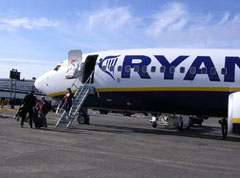Airport, Latvia, Legislation, Transport
International Internet Magazine. Baltic States news & analytics
Saturday, 18.05.2024, 10:53
Ryanair was charged just EUR 1 for aircraft ground handling at Riga Airport
 Print version
Print version |
|---|
The secret agreement which stipulates these conditions was signed by former airport executives and then-Transport Minister Ainars Slesers (Latvia's First Party/Latvia's Way), writes LETA.
As the exact number of Ryanair flights to the Riga Airport is unknown, it is impossible to calculate how much state budget money has been given away as a present to Ryanair by providing airport services to the airline for a fee that is 500% smaller than the actual price for the service. Initially Ryanair operated flights to three cities from Riga, each flight on a daily basis. This means that every day, instead of EUR 1,500 (LVL 1,050), the airport only charged the airline three euros (LVL 2.1).
The Diena article is based on copies of agreements signed on July 23, 2004, before Ryanair started operating flights to Riga. The first contract, among other things, foresees several discounts to Ryanair until April 2015, it also stipulates that the airline would have to pay EUR 500 per flight for aircraft ground handling. This agreement was signed by the then-airport head Dzintars Pomers, member of the Riga Airport board Arnis Kalniskans, and a representative from Ryanair, the agreement was also signed by Slesers and Transport Ministry's Aviation Department Director Arnis Muiznieks.
Later the same day, the same officials signed yet another agreement, the existence of which was not revealed to the public until now. Head of the Competition Council of Latvia Inese Jaunzeme explained that in the course of the investigation into airport tax breaks, the airport refused to provide the Competition Council with a copy of the agreement, a compromise was reached that the Competition Council experts could acquaint themselves with the agreement at the airport.
The document, consisting of two paragraphs, obtained by the newspaper Diena reveals that instead of the EUR 500, Ryanair was actually only asked to pay one euro for aircraft ground handling provided by the airport.
Riga Airport President Krisjanis Peters confirmed to Diena that, as he and the new management team started working at the airport, they discovered that Ryanair did pay proportionally less than other airlines, however, Peters did not mention any specific sums of money. At the end of 2007, a new agreement was reached and the former tax breaks were cancelled.
Slesers does not deny the authenticity of the agreements and admits signing them; however, he puts the blame on then airport executives. "I did support in principle Ryanair entering Latvian market, however, I had nothing to do with the specific costs and contracts, signing such agreements was the responsibility of the airport management," Slesers said, adding that he as a minister had to sign many contracts. Still, this is the only Riga Airport's agreement with an airline that has Slesers' signature on it.
The fact that Ryanair had to pay ridiculously small charges for aircraft ground handling was discovered by the State Audit Office.
Auditor General Inguna Sudraba said, "All the materials in the case regarding the breaches have been forwarded to the Prosecutor General's Office." She did not specify which the documents are in consideration. The airport is also suspected of paying Ryanair's bills for air navigation services. This sum could have been LVL 200.000 to LVL 300.000 per year. Other airlines had to pay for these services themselves.
The Prosecutor General's Office has forwarded the materials to the Corruption Prevention Bureau (CPB), which launched a criminal probe at the beginning of May. The CPB refuses to provide any information regarding the case.








 «The Baltic Course» Is Sold and Stays in Business!
«The Baltic Course» Is Sold and Stays in Business!

